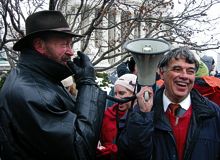This article was co-authored by Ann and Eric Scheidler.

Joe Scheidler addresses crowd at the Supreme Court over Jack Ames’ bullhorn during the 2005 March for Life, confident of an ultimate victory in his case. [Photo by EJS]
On Friday, January 28, nearly two years after the Supreme Court ruled 8-1 that League National Director Joe Scheidler and other defendants were not guilty of RICO (racketeering) charges in NOW v. Scheidler, the Seventh Circuit Court of Appeals handed down a decision that allows the nineteen-year-old case to live on.
In 1998, Scheidler, the Pro-Life Action League and other defendants were found guilty of violating RICO by a Federal District Court jury in the case brought by the National Organization for Women and a network of abortion clinics. Scheidler’s appeals to the Appellate Court were refused, but in 2002 the Supreme Court took the case and heard oral arguments on December 4.
February 2003: Supreme Court Decides for Scheidler 8-1
On February 26, 2003, the Supreme Court issued a decision, voting 8-1 in Scheidler’s favor. In the majority Opinion, Chief Justice Rehnquist stated, “Because all of the predicate acts supporting the jury’s finding of a RICO violation must be reversed, the judgment that petitioners violated RICO must also be reversed.” He concluded, “Without an underlying RICO violation, the injunction issued by the District Court must necessarily be vacated.”
Case Returns to Appellate Court
Despite the strong, unequivocal language of the Supreme Court majority opinion, the Appellate Court has not simply handed the case back to the District Court for reversal, as would usually happen.
Laymen often assume that once the Supreme Court makes a decision, the case ends there. But what actually happens is that the Supreme Court “remands” the case back to the Appellate Court, which is responsible for implementing the Supreme Court’s decision.
So, after the Supreme Court Opinion was released, each party submitted to the Court of Appeals a statement of what action we wanted them to take in response to the Supreme Court’s Opinion. Scheidler and the League requested that the Court vacate the injunction, reverse the judgment and release our bond.
NOW asked the Court of Appeals to reconsider the case, claiming that the Supreme Court didn’t really mean “all” of the predicate acts—only “most of.” NOW claims that there were four alleged acts or “crimes” that the Supreme Court overlooked and that might be sufficient to sustain the injunction and the judgment.
January 2005: Circuit Buys Clayton’s Argument
On February 26, 2004, Diane Wood, speaking for the three-judge panel (Wood, Ilana Rovner and Timothy Evans), remanded the case to the Federal District Court here in Chicago to consider Clayton’s theory of the four acts. We petitioned the Court of Appeals for a re-hearing en banc.
On January 28, 2005, Wood, on behalf of the full court of eleven judges, announced that they rejected our petition for re-hearing. Judge Ripple, who is pro-life, recused himself. Judges Manion and Kanne and Chief Judge Flaum voted for rehearing, three justices short of the six needed.
Third Trip to High Court?
We will Petition the Supreme Court in the next few weeks for clarification of their ruling of Feb. 26, 2003, focusing on three issues:
- The conflict between the Court of Appeals and the Supreme Court Opinion on whether the case should be reversed;
- The Court of Appeals’ novel reading of the meaning of extortion in federal law; and
- Whether a private party like NOW can be entitled to a nationwide federal injunction.
The Supreme Court opted not to address the injunctive relief issue in their 2003 ruling because they found no RICO violation. But the Court of Appeals has made the injunction an issue, so we will ask the Supreme Court to settle it.
Our attorneys believe that the issue of a monetary judgment for damages is settled. NOW is not entitled to any money, but that issue will have to wait to be resolved until after we get a ruling from the Supreme Court on the injunction issue.
If the Supreme Court accepts our petition (“grants Certiorari” in legalese) this will be the third time the case has come before the high court. In 1994 the Court ruled that RICO could, in principle, be used against public protestors, allowing the case to proceed to trial in 1998.
Related Articles
- Fay Clayton’s Endgames—June 2003 Action News article by Ann Scheidler on NOW’s strategy to sabotage our Supreme Court victory
- VICTORY DAY: 8-1 Supreme Court Decision Ends NOW v. Scheidler—April 2003 Action News article on the 8-1 Supreme Court victory NOW is trying to reverse
- U.S. Supreme Court Hears Scheidler Appeal—December 2002 Action News article on the oral arguments in the high court
- NOW v. Scheidler case summary from 1986 to the present
